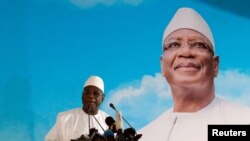Former Malian president Ibrahim Boubacar Keita, who was ousted by the military in 2020 after a turbulent seven-year rule, has died, officials said on Sunday. He was 76.
Known by his initials IBK, Keita ran the West African country from September 2013 to August 2020, when Islamist insurgents overran large areas, draining his popularity.
Disputed legislative elections, rumors of corruption, and a sputtering economy also fueled public anger and drew tens of thousands of people onto the streets of the capital Bamako demanding his resignation in 2020.
He was eventually forced out by a military coup, the leaders of which still rule Mali despite strong international objections.
"Very saddened to learn of the death of former President Ibrahim Boubacar Keita," tweeted Mali's Minister of Foreign Affairs, Abdoulaye Diop. "It is with great emotion that I bow before his memory."
The cause of death was not yet clear. A former advisor said he died at home in Bamako.
Keita, who frequently traveled abroad for medical attention, was detained and put under house arrest during the coup but restrictions were lifted amid pressure from the West African political bloc ECOWAS.
Known for his white flowing robes and a tendency to slur his words, Keita won a resounding election victory in 2013. He vowed to take on the corruption that eroded support for his predecessor Amadou Toumani Toure, also toppled in a coup.
He had a reputation for firmness forged as a prime minister in the 1990s when he took a hard line with striking trade unions. But his tenure was marred from the start by a security crisis in which al Qaeda-linked jihadists swept across the desert north.
French forces had intervened in January 2013 to drive back the insurgents who had hijacked an ethnic Tuareg rebellion. But the groups bounced back. In the nine years since, they have killed hundreds of soldiers and civilians and in some areas created their own systems of government.
Attacks by jihadists stoked ethnic clashes between rival herding and farming communities, claiming hundreds more lives and underscoring the government's lack of control.
Allegations of corruption dogged Keita's presidency from the start.
In 2014, the World Bank and International Monetary Fund froze nearly $70 million in financing after the IMF expressed concern over the purchase of a $40 million presidential jet and a separate loan for military supplies.





